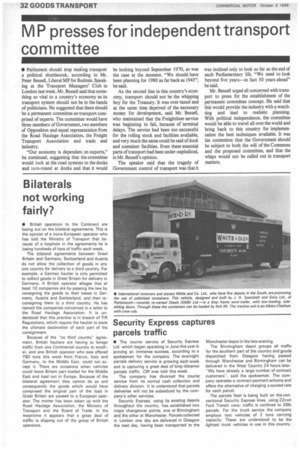Bilaterals not working fairly?
Page 34

If you've noticed an error in this article please click here to report it so we can fix it.
• British operators to the Continent are losing out on the bilateral agreements. This is the opinion of a trans-European operator who has told the Ministry of Transport that because of a loophole in the agreements he is losing hundreds of tons of traffic each week.
The bilateral agreements between Great Britain and Germany, Switzerland and Austria do not allow the collection of goods in any one country for delivery to a third country. For example, a German haulier is only permitted to collect goods in Great Britain for delivery in Germany. A British operator alleges that at least 10 companies are by-passing the law by consigning the goods to their bases in Germany, Austria and Switzerland, and then reconsigning them to a third country. He has named the companies concerned in a letter to the Road Haulage Association. It is understood that this practice is in breach of TIR Regulations, which require the haulier to state the ultimate destination of each part of the consignment.
Because of the "no third country" agreement, British hauliers are having to forego traffic from one Continental country to another, and one British operator who was offered 780 tons this week from France, Italy and Germany, to the Middle East, could not accept it. There are occasions when vehicles could leave Britain part-loaded for the Middle East and load out in Europe. Because of the bilateral agreement they cannot do so and consequently the goods which would have comprised the original part of the load in Great Britain are passed to a European operator. The matter has been taken up with the Road Haulage Association, the Ministry of Transport and the Board of Trade. In the meantime it appears that a great deal of traffic is slipping out of the grasp of British operators.




































































































































